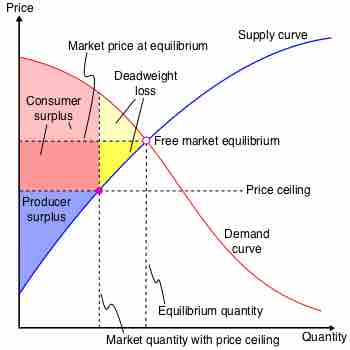An efficient market maximizes total consumer and producer surplus; there is no deadweight loss . An economic system is said to be more efficient than another (in relative terms) if it can provide more goods and services for society without using more resources. In absolute terms, a situation can be called economically efficient if:

Economic Inefficiency
A sign of economic inefficiency in a market is the presence of deadweight loss.
- No one can be made better off without making someone else worse off (commonly referred to as Pareto efficiency),
- No additional output can be obtained without increasing the amount of inputs, and
- Production proceeds at the lowest possible per-unit cost.
Economists refer to two types of market efficiency. A market has productive efficiency when units of goods are being supplied at the lowest possible average cost. This condition is satisfied if the equilibrium quantity is at the minimum point of the average total cost curve. For example, if a farm can produce 10,000 bushels of corn with 20 employees, but is currently producing 10,000 bushels with 25 employees, it is not achieving productive efficiency.
A market has allocative efficiency if the price of a product that the market is supplying is equal to the value consumers place on it. This is equivalent to saying that the marginal cost of an item is equal to its price. If a market is not allocatively efficient, then it is creating too much of something that consumers value less than other goods, or not enough of something that consumers value more. A market that produces 500 loaves of bread but only one gallon of milk is probably not allocatively efficient.
As you study economics further, it is usually safe to assume that markets are efficient unless you're dealing with a distortion (e.g. regulations, imperfect information sharing).
It is important to note that achieving economic efficiency is not always the most important goal for a society. A market can be perfectly efficient but highly unequal, for example. If 1% of the population controls virtually all the income, then the market will efficiently allocate virtually all of its production to those same people. While this is economically efficient, many would argue that it is not desirable. Efficient markets may have negative effects on those that exist outside of the market; for example, the energy market may cause environmental harm that is not captured in the economic notion of efficiency.